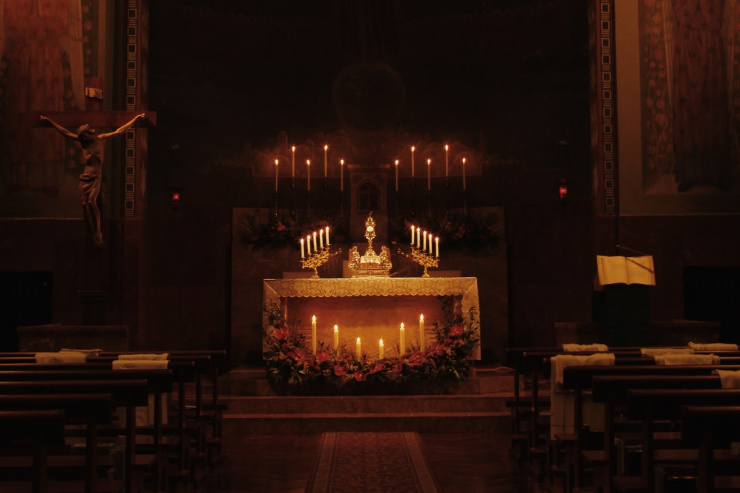Tomorrow begins the octave before Christmas. While octaves following key feast days (Easter, Christmas, Pentecost) are an important part of our liturgical celebrations, this octave precedes the feast. We are in the homestretch of preparation – we can see the light on the horizon. The Gospel readings at daily Mass begin to tell the story of the birth of Christ as found in the Gospels of Matthew and Luke.
The O Antiphons belong to this time. Each day, all over the world, Mary’s Magnificat (Luke 1:46-55) is prayed at Vespers (Evening Prayer of the Liturgy of the Hours). It is preceded by a short verse or prayer called an antiphon. From December 17-23, these antiphons invoke Our Lord using rich biblical titles for the Messiah. You may recognize them from the beloved Advent hymn, O Come, O Come Emmanuel. They are also prayed as the Alleluia verses at daily Mass during the octave.
The exact origin of the antiphons is unknown, but they are mentioned as early as the 6th century. By the 8th century, they were used in liturgical celebrations in Rome. When the first letter of each (Latin) title is read backwards, the seven spell Ero cras – tomorrow I will be!
One of my favorites is for December 19, O Root or Flower of Jesse.
O Flower of Jesse’s stem, you have been raised up as a sign for all peoples; kings stand silent in your presence; the nations bow down in worship before you. Come, let nothing keep you from coming to our aid.
This antiphon references a prophecy from Isaiah that has become one of my favorites this Advent: “There shall come forth a shoot from the stump of Jesse, and a branch from his roots shall bear fruit” (Isaiah 11:1).
Jesse was the father of King David, whom the Lord promised through the prophet Samuel an everlasting throne. When David wanted to build the Lord a house (the Temple), the Lord instead promised that he would build David a house: he would establish his kingdom through David’s offspring. “Your house and your kingdom shall be made sure forever before me. Your throne shall be established forever” (2 Sam 7:16).
To anyone paying attention, however, it seemed that promise was short-lived. The united kingdom did not last even fifty years after the death of David. The kingdom split into two- Israel and Judah – and they became enemies. By the time of Isaiah, there were still Davidic kings on the throne of Judah, but many had been quite wicked. Evil queen Athaliah had tried to snuff out the line of David forever. And while she was unsuccessful, the glory of the kingdom of David and Solomon was long gone.
A theme of Isaiah’s prophecies is the exile of the chosen people. Assyria conquered the Kingdom of Israel and took the people into exile; shortly after, the kingdom of Judah fell to Babylon. With this, it seemed as if the throne of David would be extinguished forever. Isaiah is speaking to a people who were probably questioning the promise to David. His line was supposed to be everlasting. His kingdom was supposed to last forever. Had God forgotten his promise?
The line of Jesse appeared to be a stump. Dead. Cut off.
But even in this barrenness, the Jewish people were called to hope in the Lord’s faithfulness. They had to trust that God had not forgotten them. They were called to wait with a hopeful expectation. The Lord has not forgotten. He is faithful.
The reminder of this O Antiphon is to trust in the Lord’s faithfulness. That may be easier said than done. Perhaps you have a prayer that seems to be unanswered. Maybe your hopes and dreams seem like a stump. Maybe it seems God has forgotten you. But he is listening. He is faithful.
Pray with trust that the Lord is working, even if you can’t see it. Wait. Watch. That small shoot: at first it is small. Nothing dramatic. Almost unnoticeable. But because we have been faithful, waiting, watching, watering, we notice even the little tiny shoot. And then the flower blossoms.
Lord, help me to trust in you. It’s easy to get discouraged or even apathetic. Help to pray in those moments of dryness when prayer is difficult. Help me to have faith that even in the barren stump, in what seems to be dead, new life can come. Lord, be faithful to your promise!
“The days are coming—oracle of the Lord—when I will fulfill the promise I made to the house of Israel and the house of Judah. In those days, at that time, I will make a just shoot spring up for David; he shall do what is right and just in the land. In those days Judah shall be saved and Jerusalem shall dwell safely; this is the name they shall call her: ‘The Lord our justice.’” (Jeremiah 33:14-16)
May these O Antiphons increase our expectation and excitement for the upcoming feast of Christmas!
Photo by Andriyko Podilnyk on Unsplash














